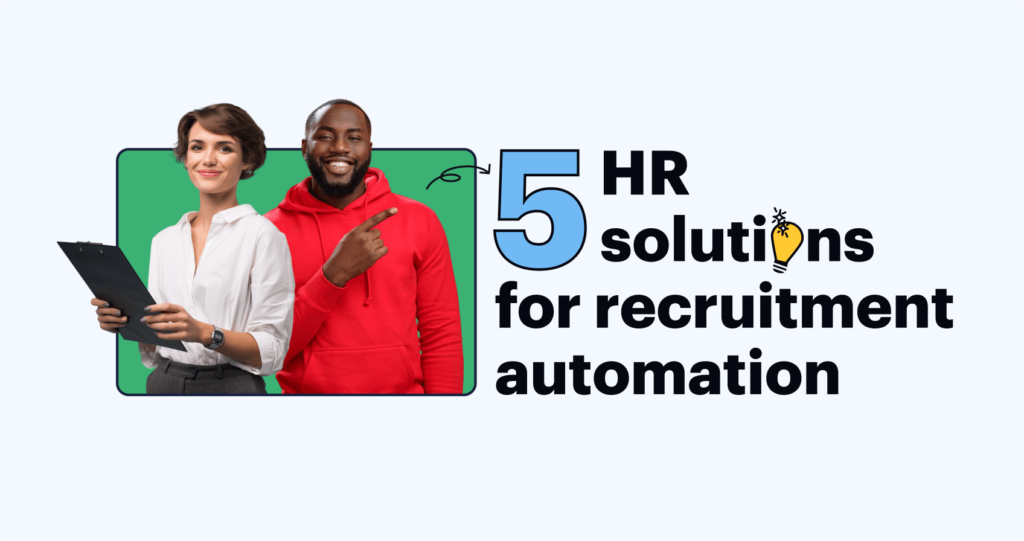
Hiring new employees can be a resource-intensive and time-consuming process.
76% of hiring managers find attracting the right candidates for the job the most challenging, while many spend up to one-third of their workweek in hiring a candidate for a single role.
As a result, they end up hiring candidates that are less-qualified for the job, and settle for less.
Luckily, there are tools that allow you to save time and automate many of the steps involved in recruiting, while also increasing efficiency.
In this blog, we’ll explore the five HR solutions that can help you automate the hiring process and save you from all that hassle.
Benefits of automating the hiring process
Not only does HR workflow automation help save time but it also optimizes the overall hiring process. Here are some of the most significant benefits of leveraging automation to hire new employees:
Improved efficiency and reduced time-to-hire
With automation, you can quickly filter through resumes, pre-screen candidates, and schedule interviews, all without the need for manual input.
This way, you harness talents and hire candidates faster, which is a win-win for both parties. Moreover, you reduce the likelihood of human error and increase the efficiency of your hiring process.
Enhanced candidate experience
With automation, you can provide timely and regular communication with candidates throughout the recruitment process. This can help create a positive impression of the company, even for candidates who aren’t ultimately offered a position.
Data-driven decisions
You get valuable data insights into each stage of the recruitment process. This helps with identifying trends, analyzing performance metrics, and making data-driven decisions about hiring.

5 HR solutions to help you streamline and automate your hiring process
1. Skill assessment platform
Discovering candidates with the right skill set for the job can be tough but manageable. All you need is a proper system of assessing and filtering out candidates at each stage of the hiring process. A skill assessment platform helps evaluate your candidates in the most efficient and bias-free manner.
Here are some steps you can take to assess candidates effectively:
Develop a job description
Understanding the skills, experience, and qualifications required for the job is crucial for finding a suitable candidate. Start with developing a job description that outlines the duties, responsibilities, and qualifications for the role.
Prepare an assessment plan
Develop a plan that outlines the steps you will take to evaluate candidates. This plan should include different assessment methods, such as interviews, skills tests, and reference checks.
This is where a skill assessment platform comes into the picture. With its help, you can plan several rounds of evaluation that span behavior, skills, and pre-employment tests.
Use structured interviews
Make sure to prepare your interview structures and questions in advance instead of coming up with questions on the spot or using a standard set of questions regardless of the role you’re hiring for. For example, when hiring a C++ developer, always have a bunch of C++ interview questions prepared beforehand—make sure you consider industry trends and what the role entails.
Consider diversity and inclusion
Ensure your assessment process is fair and unbiased and considers diversity and inclusion. This can include using diverse interview panels, avoiding bias in job descriptions and assessments, and providing equal opportunities to all candidates, including neurodivergent individuals.
2. AI-powered resume screening software
A resume screening software helps you screen multiple resumes at once and filter out only the best resumes based on your specific needs. It uses algorithms and artificial intelligence to analyze resumes and identify candidates who match the required skills, experience, and qualifications for the job.
How to choose the right resume-screening tool for your organization
- Make sure it has all the essential features, such as resume parsing, keyword matching, applicant tracking system (ATS) integration, etc
- Look for a tool that is user-friendly and easy to use for both recruiters and candidates. The tool should have a clear interface and easy navigation and should integrate with other recruitment tools
- Consider the accuracy of the tool in analyzing and interpreting resumes. For better assurance, opt for free trials of different tools and choose the most accurate one

3. Video interviewing platform
Video interviewing platforms have become increasingly popular in recent years because they offer several advantages over traditional in-person interviews or phone interviews.
Particularly in remote hiring scenarios, these platforms have allowed recruiters to evaluate candidates from anywhere in the world without the need for in-person meetings.
Here are some reasons why you might need a video interviewing platform:
- Video interviews can be conducted from anywhere without the need for travel, saving time and money for both the interviewer and the interviewee
- Recruiters can screen more candidates in less time, which speeds up the hiring process
- Candidates appreciate the convenience and flexibility of video interviews, which can be scheduled at a time that works for them, without the need for time off work or travel
- Video interviewing platforms often offer tools such as recorded interviews, analytics, and assessment features, which enable recruiters to better evaluate candidates based on their answers, body language, and overall performance
How to choose the right tool for your organization
- Look for a platform that offers the features you need, such as live video interviews, recorded interviews, analytics, and candidate assessments
- Consider whether the platform integrates with your existing HR software or applicant tracking system, as this can help streamline the hiring process
- Consider the platform’s accessibility, speed, and reliability, as well as the quality of video and audio
- Ensure that the platform adheres to strict security standards and data privacy regulations, such as GDPR or CCPA, to protect sensitive candidate information
4. Applicant tracking system (ATS)
Going through hundreds (often thousands) of applications every time you need to fill up a position can be very exhausting. An ATS provides you with a central database to store all your candidate data and source candidates as and when needed.
Here’s how an ATS typically automates the hiring workflow:
- Posting job openings on multiple job boards and social media platforms
- Collecting and organizing resumes and applications from various sources, including email, online forms, and social media platforms
- Screening and filtering resumes using predefined criteria and keywords
- Scheduling interviews and sending reminders to candidates and recruiters
- Evaluating candidate qualifications and skills using assessment tools and ranking them based on predetermined criteria
- Generating reports and analytics to monitor recruitment metrics such as time-to-hire, cost-per-hire, and source of hire
- Integrating with other HR systems, such as payroll and performance management
Selecting the best ATS for your company
- Define your recruitment process and requirements—the number of rounds, the hiring structure, the communication process, the interview process, etc. This will help you identify the features and functionality you need in an ATS
- Consider the number of positions you need to fill and how often you hire. For example, if you’re continuously recruiting candidates for your organization, you’re definitely going to need a different ATS than those hiring once or twice a year
- If you have specific hiring requirements, then it’s better to choose an ATS with a custom pricing plan that meets your specific needs
- Depending on the size of your company and your hiring needs, determine if you need your ATS to have the analytics functionality. It’s essential to track different hiring parameters, such as clicks on your job applications, the effectiveness of your pre-screening tests, etc

5. Digital onboarding tool
Employee onboarding is an essential part of the hiring process. It helps new employees adjust to their new workplace, understand their job responsibilities, and learn about the company’s culture, values, and expectations.
Moreover, it helps you get in their good books and reduce your employee turnover rate. The best way forward is to automate the onboarding process, where you can reduce the paperwork you need to welcome new employees, reduce the risk of human error and focus on other high-priority tasks.
How to choose the right onboarding tool
- Look for an employee onboarding tool that allows you to customize the onboarding process to meet your specific needs. The tool should allow you to add your company’s branding and messaging, as well as any necessary forms or documents
- Create a solid employee onboarding program that helps you target a specific hiring problem and choose an onboarding solution that solves that problem. For example, if you want to save time in the hiring process and automate repetitive tasks, airSlate has an employee onboarding flow template that helps collect and pre-fill new employee information seamlessly from a CRM
- Choose an onboarding tool provider that offers comprehensive training and support. The provider should have a help center or knowledge base, as well as phone and email support, to help you quickly resolve any issues or questions
Make your hiring process efficient with automation tools
Automating the hiring process can significantly improve the efficiency of HR operations. With the right HR solutions, organizations can streamline recruitment processes, reduce costs, and enhance the candidate experience.
Assess your needs, find tools that serve the exact requirements, try out different tools, and compare the functionalities to select the best tool for your organization.
